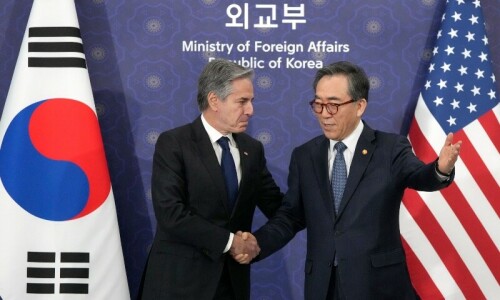RIYADH, Nov 16: A blunder by Opec on Friday exposed a disagreement between Saudi Arabia and Iran about the falling dollar when a private meeting of ministers was broadcast to journalists by mistake.
In an embarrassing oversight, the private meeting of foreign, finance and oil ministers from the 12 members of the Organisation of Petroleum Exporting Countries was broadcast for 30 minutes on closed-circuit television in the media room.
Iran’s Foreign Minister Manouchehr Mottaki said in a written proposal that a final declaration by Opec leaders should express concern by member states over the fall of the US dollar.
Reacting to the request, Saudi Foreign Minister Prince Saud al-Faisal warned that mentioning the falling dollar could lead to the “collapse” of the US currency.
“There are media people outside waiting to catch this point and they will add to it (exaggerate) and we may find that the dollar collapses,” he said.
Member states should express concern over “the continued depreciation of the US dollar” in the final declaration, Mr Mottaki said.
Iran was joined in its attempt to put the falling dollar on the agenda by another of Washington’s antagonisers, Venezuela.
Prince Saud, who was chairing the meeting, described the Iranian proposal as “sensitive”.
”This is a sensitive issue. It will cause the dollar to drop further, thus complicating the problems we are facing from the dollar’s fall,” Prince Saud said.The fall of the dollar, which has declined by about 15 per cent in 12 months, has affected the revenues of Opec members because most of them price and sell their oil exports in the US currency.
The remarkable insight into the inner workings of the Organisation of Petroleum Exporting Countries, which produces 40 per cent of world oil, ended when an official emerged to switch off the television.
Ironically, Iran has moved away from the dollar and now prices nearly all of its exports in local currency, meaning most of its revenues are in euros and yen.
An Iranian official said that this had saved the country about 10 billion dollars (14 billion euros) this year.
He also said that Opec was unlikely to make a statement on the dollar because the organisation believed the issue of pricing oil was a sovereign issue that should be dealt with individually by members.
The 12-member organisation, dominated by Saudi Arabia, produces about 40 per cent of world oil and attempts to regulate production of its members through a quota system.—AFP








































Dear visitor, the comments section is undergoing an overhaul and will return soon.